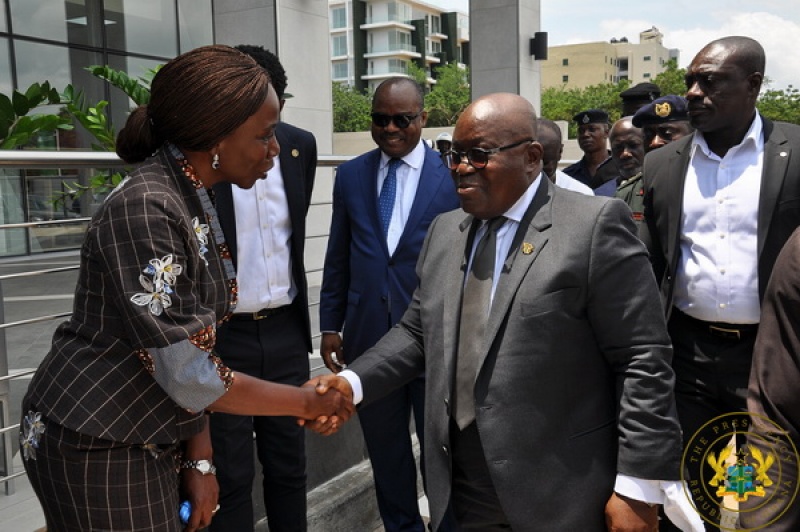
President Nana Addo Dankwa Akufo-Addo has stated that the current average bank lending rate of 27.5 per cent is strangulating the private sector.
He observed that the development would not complement efforts to make Ghana’s economy globally competitive.
The President, who was speaking at the inauguration of the magnificent new headquarters building of the Standard Chartered (Stanchart) Bank in Accra on Wednesday, lamented the gap between declining inflation rates and the Bank of Ghana’s (BoG’s) Monetary Policy Rate, on the one hand, and the lending rates being charged by commercial banks, on the other.
He said the gap must be bridged and challenged the banks to complement the efforts of the government to maintain fiscal discipline by bringing down lending rates.
President Akufo-Addo disclosed that he had been a long-standing customer of Stanchart and said “as Mr President’s bank, it will be great if Standard Chartered will take the lead in rate reductions”.
Providing some figures to support his call, he said although private sector lending had improved from GH¢28.9 billion in November 2016 to GH¢34.4 billion as of June 2018, the current average banking lending rate of 27.5 per cent was not private sector friendly.
He indicated that the last 21 months had witnessed a decline in inflation from 15.4 per cent in 2016 to 11.8 per cent in December 2017 and 9.9 per cent at the end of August 2018.
The Monetary Policy Rate had also fallen from 25.5 per cent in 2016 to 17 per cent.
President Akufo-Addo added that the 91-day treasury bill rate had come down from 17 per cent in 2016 to 13.3 per cent but bank lending rates remained unacceptably high.
The President said the yield on the 91-day treasury bill fell to 13.3 per cent from December 2017 to September this year.
The BoG policy rate had been reduced by 850 basis points from 25.5 per cent to 17 per cent.
Stanchart role
President Akufo-Addo said chronicling Ghana’s economic trajectory would not be complete without mentioning the role of the Standard Chartered Bank.
He, therefore, congratulated the bank on remaining a resilient presence in Ghana over the last 122 years to serve the needs of the people and help industry to grow.
The President said banks should not be mere profit-making entities but active partners with the government to build a healthy and strong economy.
Challenges
President Akufo-Addo said in January 2017 it emerged that apart from the non-performing loans of some banks and the $2.5 billion energy sector legacy debt, there was systemic widespread irresponsible corporate governance and liquidity challenges, all with the complicity of some officials of the BoG.
He said shockingly, some directors of some of the collapsed commercial banks took depositors’ money, used it for their own businesses and failed to pay, culminating in liquidity challenges and leading to the insolvency of the banks.
President Akufo-Addo noted that the central bank had to come in to save the deposits of over one million customers who would have lost their savings.
Besides, many workers were saved from losing their jobs.
Altogether, the President said, the government and the BoG provided 12.7 billion to save the situation to avoid a banking crisis.
He stated that the formation of the Ghana Consolidated Bank out of the collapsed banks and the overall cleaning of the financial sector were necessary to safeguard the health and strength of the economy.
The law will bite
The President stated that those responsible for the problems with the seven banks would be made to face the full brunt of the law and suffer the consequences.
He said the Financial Sector Development Plan embarked upon would lead to the creation of a more robust financial and banking architecture to mitigate abuses by industry players, adding that under the project, the government would undertake consumer education and strengthen protection guidelines.
CEO
The Chief Executive of Standard Chartered Bank Ghana, Mrs Mansa Nettey, said the bank was collaborating with other players in the industry to support the government’s efforts to deal with the increasing rate of cyber crime.
She said the 13-floor headquarters building was eco-friendly and constructed with modern innovation that made it energy efficient, highly safe and had multi-trading rooms, nursing mother rooms and a multi-faith room.
BOG
The Governor of the BoG, Dr Ernest Addison, described the country’s financial position as strong, with a very bright future, as supported by the recent Standard and Poor’s rating of the country.
He stated that non-performing loans had reduced and that majority of banks in Ghana were strong, despite the recent problems, adding that only a few financial institutions were under stress due to bad institutional practices.
Source : graphic.com.gh

































